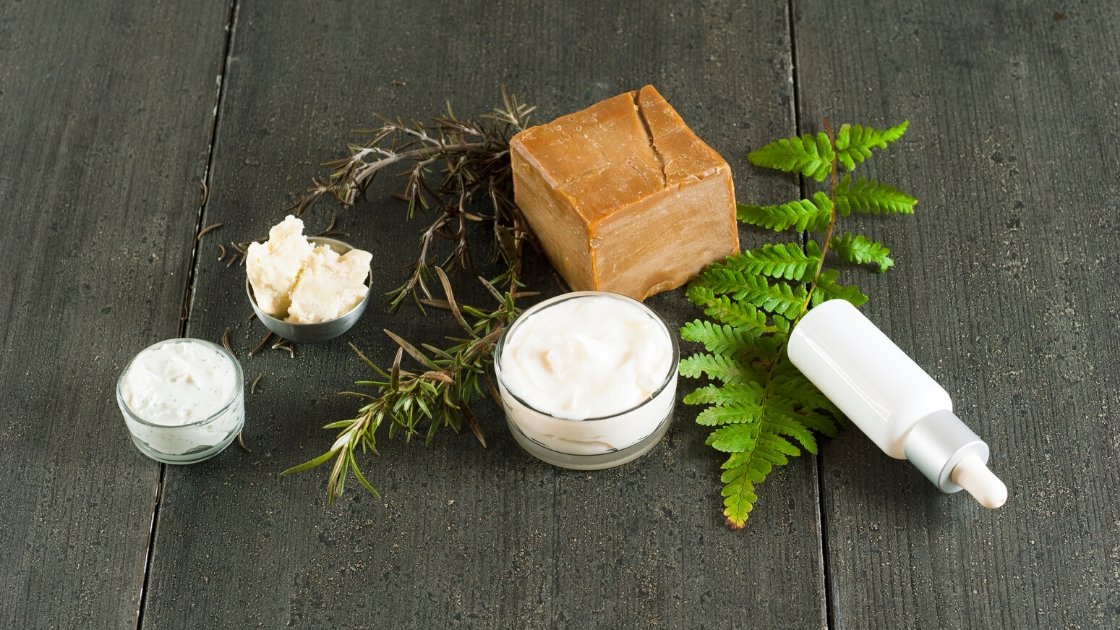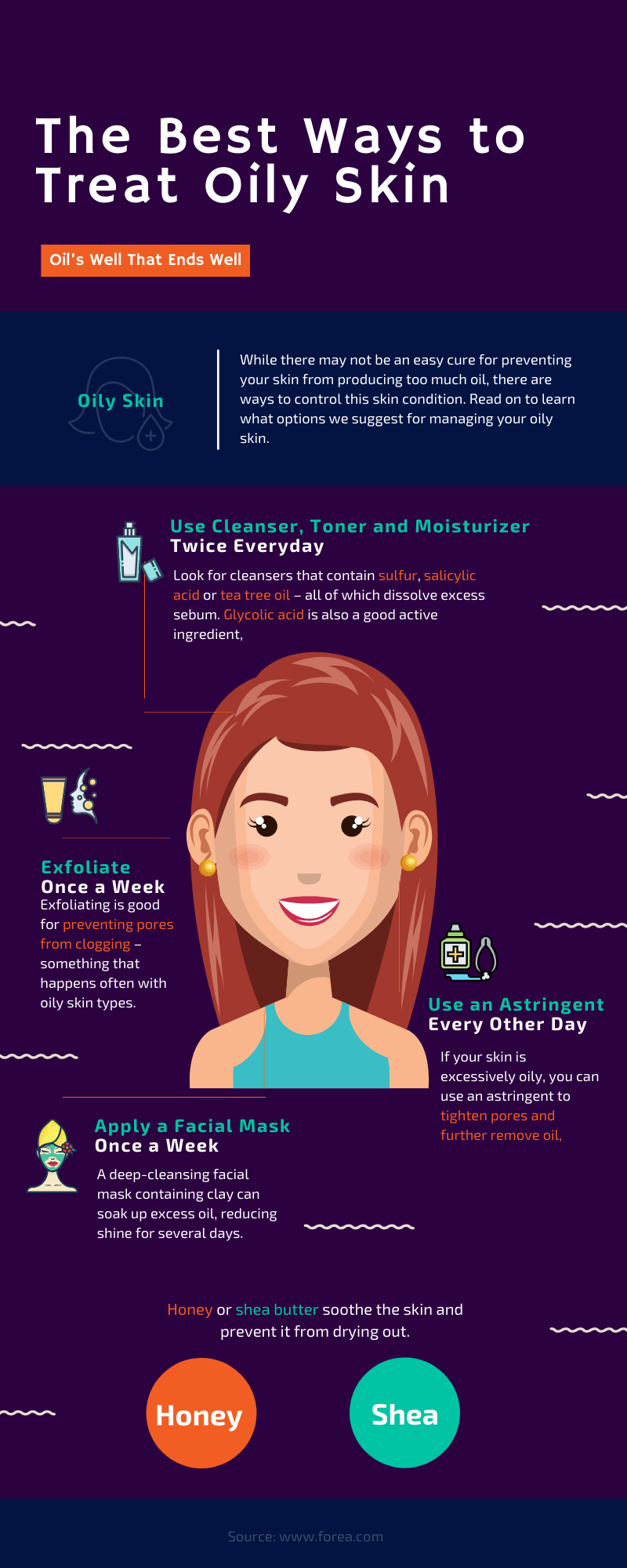Skin Care for Oily Skin
Skin Care for Oily Skin : Oily skin is a common condition among both men and women. Those who have an oily skin, often complain about a greasy feeling to their skin, or excessive dryness because of using strong chemically loaded products.
But oily skin treatments are just as common and simple. With the right daily routine, you can feel better about your skin and how it appears.
What is an oily skin type?
Oil is not an alien factor to the skin. In fact, a kind of natural oil called sebum is produced by sebaceous glands in the skin. Sebum is secreted through the pores to moisturize the skin, keep it flexible, and reduce the risk of irritation.
Also, moderate amounts of sebum play an important role in removing dead skin cells and factors that can cause irritation from across the skin.
Depending on the amount of sebum secretion, your skin can be categorized as oily, dry, or combination. In an oily skin type, the oil glands are overactive, causing excessive oil to be secreted. As a result, the skin shines and feels greasy. But this is just what happens to your skin on the surface level. The excess oil can be trapped inside your skin pores and clog them along with dead skin cells. As a result, the size of the skin pores increases, and acne breakouts appear on your face.
What makes an oily skin?
The condition is often hereditary. This means if either of your parents (or both) had an oily skin, you too are likely to have it. Another contributor to the overactivity of the glands is hormonal disbalance caused by a variety of factors such as the puberty in teenagers, menstrual cycle in women, pregnancy, and menopause. Surprisingly, keeping the skin too dry can lead to excessive oil too.
This is because releasing oil is only a natural function of your skin. The oil glands try to counter the dryness with excessive oil production. Now you know the importance of this post.
What is a skin care routine for an oily face?
If you have an oily skin, or an oily T zone, this means your skin care regimen must address the excessive oil in the first place.
Clean
To properly clean your skin means to use the right cleanser and for the right number of times. Gel-type cleansers, with salicylic acid, sulfur, tea tree oil, or glycolic acid work well for oily skin.
Let the cleanser gently foam on your skin and remove excessive sebum as well as dead skin cells. Use the cleanser maximum twice a day, so as to not risk drying your skin.
After cleaning your face with a face wash, use a gentle toner in order to deep clean your skin pores. Toners also balance the pH of the face, and prevent acne break outs due to bacteria and impurities.
The best time to apply a toner is at night, before going to bed. However, in case you feel your skin could use more cleaning in the morning, you can use toners in the morning as well, applying it only to your T-zone.
It is important to make sure your toner doesn’t contain alcohol, as it tends to dry the skin. We have already mentioned that the oil glands produce more oil when the skin goes dry, to compensate for the loss of their efforts to keep the skin lubricated.
MoisturizeMoisturizing is an important step in every skin care routine and oily skin is no exception. It is better to choose an oil-free and water-based moisturizer. Also, you can care to choose a product with SPF protection (at least SPF 30) in the morning.
This is because you need to protect your skin against the sun. While using sunscreen on top of the moisturizer might not allow either of them have an optimal function, using a moisturizer with SPF protection can do the trick.ExfoliateExfoliation can help remove the residues that clog your skin pores and wreak havoc on your skin.
Exfoliating twice a week with oil-free products has proved helpful for oily skin.Use astringent and salicylic acidAstringents are helpful products for shrinking the pores, while salicylic acid is a chemical exfoliant which deep cleans the face and keeps the oily look at bay.
You can use these products as extra help once a week, since overusing them can cause skin dryness and irritation.Use retinolAnother extra ingredient you can add to your oily skin treatment is retinol or Vitamin A.
Retinol is a strong element for skin rejuvenation and collagen production. As such, it keeps the skin tissues tight, prevents wrinkles, and shrinks the skin pores. As a result, not only you will get a smooth skin, but also you will control the oil released by your glands.Apply eye creamIf you have an oily skin, it doesn’t mean the area around your eyes do not need to be taken care of.
Dark circles and wrinkles haunt down every skin type. Therefore, you can use a light eye cream which absorbs quickly, provides hydration to your skin, and makes the area look brighter.
Use face masksIn addition to the above-mentioned steps, you can take face masks once or twice a day in order to hydrate your skin, deep clean and exfoliate it, and address blackheads.Use Micellar WaterSometimes at the end of the day, you just feel too tired to go through face cleansing gels and toners.
But sleeping with make-up on while your skin has been exposed to all sorts of pollutants all day long is never a good idea. You can keep some micellar water and cotton pads beside your bed and clean your face with it before crashing to bed. It needs no rinsing or washing.
Yay!Wash your sheets and pillow caseWe have also referred to this point in our post about 13 Powerful Home Remedies for Acne in 2020. Washing the sheets, especially the pillow case, is an often overlooked step in skin care routines.
The pillow case absorbs all the excessive oil, skin cells, make up, dust, and dirt in the air. If you use this pillow case for a long time without washing, it means you’re exposing your skin to factors you’ve been running away from all day long.
If gone unwashed for more than a week, your pillow case can cause further clogging of your skin pores, not to mention that’s what acnes need to rush in.
What kind of make-up products should I use for an oily skin?
Oil-free products are the ultimate choice for oily skin types. Before applying make-up, you need to use a special kind of primer which will cover the skin pores and prevent the absorption of make-up. You can also choose mattifying bases which will absorb the oil produced during the day.
In addition to products that can fix and lock your make-up, you can also use a translucent face powder to give a matte effect to your face and control the shine, especially around the oily areas.
Besides this, if your skin tends to get oilier towards the end of the day and shine, you can use special oil-control paper.
This paper can be apply over the make up for a quick fix, without having to clean it. You specially need blotting the oily shine off your skin in case you need to add another layer of make up on the one you did earlier in the morning.
It might also be better to stick with powder-based make-up products rather than the ones in liquid or cream consistency. Powder goes better with oily skin, without making it feel extra heavy or greasy.

Is it okay to use moisturizers for oily skin types?
As the outermost protective barrier of the body, our skin is exposed to pollution, dirt, UV rays of the sun, and a variety of other factors which can damage the skin.
As a result of this damage, the skin loses moisture, dries out, becomes more vulnerable and even oilier.
Now oily skin is a skin with excessive oil, not moisture. Moisture is related to hydration, and moisturizing your skin does not mean making it greasier.
Hydration is necessary for rejuvenating and refreshing the skin. Without hydration, the skin is more prone to irritation, inflammation, acne flare ups, and wrinkles. Remember, the more your skin damages, the oilier it gets because your body finds it a natural solution to fix the problem.
What kind of moisturizer is suitable for an oily skin?
A suitable moisturizer for oily skin types is an oil-free or noncomedogenic product, and has a lightweight formula. The best product will contain hyaluronic acid, which is an effective hydrating factor, retinol, and substances like aloe vera water.
Your skin shouldn’t look excessively shiny after applying the right moisturizer. It should rather look fresh and matte.
How often should I apply a moisturizer on an oily skin?
The best time for applying a moisturizer is after cleansing the face. As we suggested cleaning it twice every day, you can moisturize your skin twice. This means once in the morning and once in the afternoon. A pro tip is to moisturize your skin as early after washing as possible. This means extra hydration for your skin.
There you go, with a comprehensive guide to skin care routines for oily skin. There are many products out there that will help you with your oily skin. You just need to make sure about what you want. As oily skin tends to be prone to acne break outs, we have your complete guide in 13 Powerful Home Remedies for Acne in 2020.

The Best Ways to Treat Oily Skin
FAQ
What is best for oily face?
Use a Cleanser with Salicylic Acid
Clinique Acne Solutions Clear Skin System has three key oily-skin products, including a cleanser, toner, and moisturizer with salicylic acid and benzoyl peroxide (two dermatologist favorites).
What food causes oily face?
5 foods that make your skin oily
Dairy products. Surely, they're great for health but they aren't very good for your skin! ...
Fried foods. Do you love eating fried foods? ...
Salty foods. Salt is important for our taste, diet as well as health but, too much of salt can cause dehydration in the skin. ...
Alcohol. ...
Sugary foods.
Is coconut oil good for oily skin?
Coconut oil is high in lauric acid, which helps kill the bacteria that cause acne. Applying coconut oil to the skin can kill acne-causing bacteria and increase moisture, which may also reduce acne scarring. However, coconut oil may be problematic for people with very oily skin. ... However, eating coconut oil is safe.






